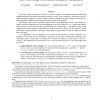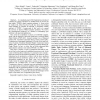281 search results - page 15 / 57 » A revealed preference approach to computational complexity i... |
STOC
2007
ACM
14 years 9 months ago
2007
ACM
A zero-knowledge proof allows a prover to convince a verifier of an assertion without revealing any further information beyond the fact that the assertion is true. Secure multipar...
SIGECOM
2011
ACM
12 years 11 months ago
2011
ACM
In many settings, a group of agents must come to a joint decision on multiple issues. In practice, this is often done by voting on the issues in sequence. In this paper, we model ...
ADS
2004
Springer
14 years 2 months ago
2004
Springer
With COSIMAB2B we demonstrate a prototype of a complex and visionary e-procurement application. The embodied character agent named COSIMA is able to respect a customer's prefe...
FOCS
2009
IEEE
14 years 3 months ago
2009
IEEE
— In a landmark paper [32], Papadimitriou introduced a number of syntactic subclasses of TFNP based on proof styles that (unlike TFNP) admit complete problems. A recent series of...
SIGECOM
2005
ACM
14 years 2 months ago
2005
ACM
We present a new approach to representing coalitional games based on rules that describe the marginal contributions of the agents. This representation scheme captures characterist...




